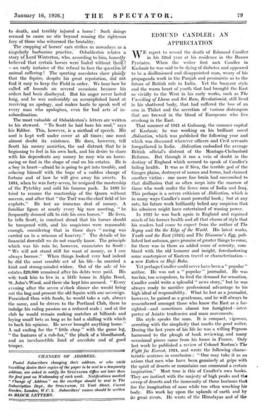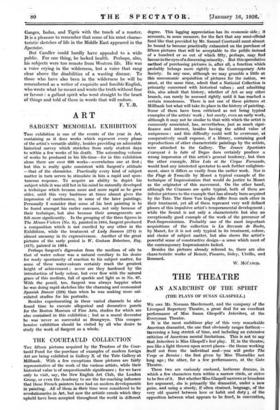EDML ND CANDLER: AN APPRECIATION
WE regret to record the death- of Edmund Candler in his 52nd year at his residence in the Basses Pyrenees. When the writer first met Candler in Kashmir he was said to be dying of diabetes and appeared to be a disillusioned and disappointed man, weary of his propaganda work in the Punjab and pessimistic as to the future of British rule in India. Yet the buoyant style and the warm heart of youth that had brought the East so vividly to the West in 'his early works, such as The Unveiling of Lhasa and Sri Rant, Revolutionist, still lived in his shattered body, that had suffered the loss of an arm in Thibet and the accretion of various distempers that are brewed in the blood of Europeans who live overlong in the East.
That summer -of 1921 at Guhnarg, the summer capital of kashmir; he was working on his- brilliant novel Abdication, whicli was published the folloWing year and which was discussed wherever officers and Civil servants foregathered in India. Abdication embodied the average Britiah 'official's distrust of the Montagu-Chelmsford Reforms. But through it ran a vein of doubt in the destiny of England which seemed to speak of Candler's failing health It was as if Siva, the terrible god Of the Ganges plains, destroyer of names and forms, had claimed another victim : one more fine brain had succumbed to that disilluSiOn 'that so often seeps into the marrow of those who work under the fierce suns of India and Iraq. This perhaps is a severe criticism of Abdication, which is in many ways Candler's most powerful book; but at any rate, his future work' brilliantly belied any suspicion that his admirers might have entertained of waning power.
In 1922 he was back again in England and regained Much of his fornier health and all that charm of style that his readers had conic to expect from the author of The Sepoy and On the Edge of the World. His latest works, Youth and the East (1924) and The Dinosaur's Egg, pub- lished last autumn, gave promise of greater things to come, for there was in them an added sense of serenity, com- bined with the old humoiir and insight, foreshadowing some masterpiece of Eastern travel or characterization- a new Eothen or Haji Baba.
Yet perhaps Candler could never have been a " popular " author. He was not a " popular " journalist. He was too fair, too scrupulous, to feed the demand for sensation. Candler could write a splendid " news story," but he was always ready to sacrifice professional advantage to his high ideal of responsibility. What he lost as a journalist, however, he gained as a gentleman, and he will always be remembered amongst those who know the East as a far- sighted—and sometimes alitiost too farsighted—inter- preter of Asiatic tendencies and mass movements. His style speaks the man. It is compact, vigorous, arresting with the simplicity that marks the good writer. During the last years of his life he was a willing Pegasus harnessed to the plough of book reviewing, and many occasional pieces - came frotn his house in France. Only last week he published a review of Colonel Norton's The Fight for Everest, 1924, and wrote the following charac- teristic sentence in conclusion : " One may take it as an axiom that men who have been genuinely at grips with the spirit of deserts or mountains can command a certain inspiration." Most true is this of Candler's own books. They are instinct with the majesty Of high peaks and the sweep of deserts and the immensity of those horizons that fire the imagination of man while too often wrecking his body. His work lay upon the uplands of earth and by its great rivers. He wrote of the Himalayas and of the Ganges, Indus, and Tigris with the touch of a master. It is a pleasure to remember that some of his most charac- teristic sketches of life in the Middle East appeared in the Spectator.'
But Candler could hardly have appealed to a wide public. For one thing, he lacked health. Perhaps, also, his subjects were too remote from Western life. ni.4 was -a voice crying in the wilderness, but a voice that rang clear above the disabilities of a wasting disease. To those who have also been in the wilderness he will be remembered as a writer of exquisite and forcible English, who wrote what he meant and Wrote the truth without fear or iavour a gallant spirit who went straight to the heart of thing's and told of them in words that will endure.
F. Y.-13.















































 Previous page
Previous page